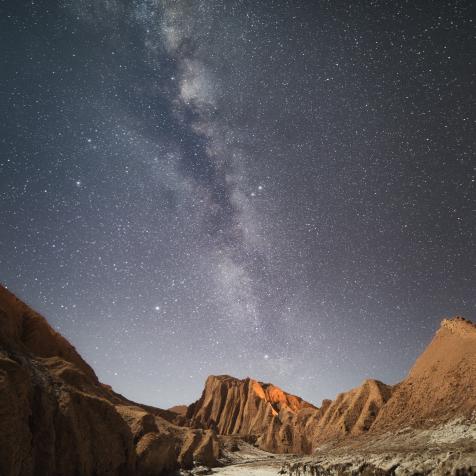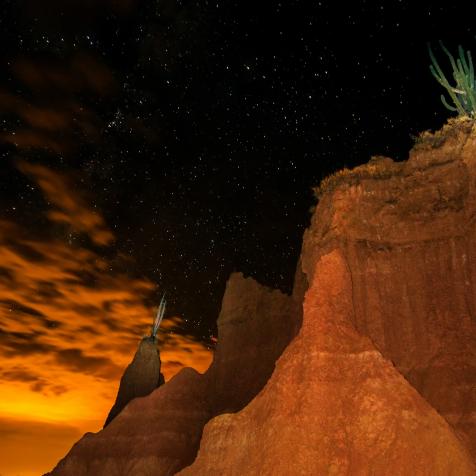
NASA JPL-Caltech
The 10 Greatest Scientific Achievements of 2018
The year was filled with amazing influential discoveries that rock the world of science.
December is the month of best-of lists, which is always a challenge — especially when you're ranking the most influential scientific achievements of the year. Who's to say a discovery of an ancient fossil is any better than the development of a new drug? Or that landing on an asteroid is any better than discovering spider milk? Alas, you have to draw the line somewhere, and here's where we drew ours. Check out our list of the top 10 greatest scientific achievements of 2018 below.
We Found the World's Oldest Cave Art
... and surprise! It wasn't made by humans. In February, researchers announced that they had found 65,000-year-old paintings in a cave in Spain. Not only does this make them the oldest known cave art, that timing actually predates the arrival of Homo sapiens to Europe. That means that someone else must have made them. Neanderthals, most likely, which means they probably had cognitive abilities comparable to our Homo sapiens ancestors. "Even a caveman could do it," indeed.
Scientists Discovered a New Organ
It's called the interstitium, and it's all over your insides — in between your muscles, around your veins and arteries, lining your digestive tract, surrounding your lungs. The discovery was announced in March, and scientists were only able to find it because of a high-tech new imaging technique that doesn't require any cutting. That's important, since the interstitium is just a series of interconnected, fluid-filled cavities, and those cavities collapse when you take a tissue sample. Welcome to the body, interstitium!
The Golden State Killer Was Caught via a Genealogy Website
In April, Joseph DeAngel — the man we now know to be the Golden State Killer, a serial murderer who got away with his crimes for decades — was arrested based on DNA evidence. But that evidence wasn't in any federal database; instead, it happened to match the DNA of a relative who had uploaded their genealogy data to the open-source website GEDmatch. It's both an astonishing feat for law enforcement and a worrying sign for privacy expectation in the future.
We Discovered a Whole Lot of Distant Worlds
In February, we made the first discovery of extragalactic planets — that is, planets not outside of our solar system, but outside of our galaxy. In July, we found out that Jupiter had 12 more moons we didn't know about. And at the beginning of October, we got a twofer with the first discovery of a moon beyond our solar system and the discovery of a little world beyond Pluto that astronomers nicknamed "the Goblin."
The First Ancient-Human Hybrid Was Discovered
In August, paleogeneticists announced that they had discovered something extraordinary: an ancient human female who died in a Siberian cave 90,000 years ago was the child of a Neanderthal mother and a Denisovan father. Neanderthals and Denisovans are both close cousins of Homo sapiens, and while we've had some evidence that ancient humans got down with many different hominid species, this is the biggest discovery we've made to date.
We Found Signs of Liquid Water on Mars
In July, the European Space Agency's (ESA) Mars Express spacecraft received radar data suggestive of a 20-kilometer (12.5-mile) zone of liquid water in sediments below the south pole of Mars. While we've discovered water ice and even evidence of snowstorms on Mars, this is the most promising evidence for water in its liquid form, which is good news for future crewed missions.
Lots of Spacecraft Launched and Landed
We've been launching things into space like crazy. The most famous, of course, was the cherry-red Tesla roadster SpaceX shot into heliocentric orbit in February, complete with a live video feed from the dashboard. But there were other missions, too: ESA's BepiColombo spacecraft departed for its journey to Mercury, Japan's Hayabusa2 spacecraft landed rovers on the asteroid Ryugu, and NASA's OSIRIS-REx spacecraft successfully arrived at the asteroid Bennu. Most exciting of all? We landed another craft on Mars. NASA's Insight Lander arrived on the Red Planet in late November, and it's sending back some stunning images.
We Discovered the Oldest Known Organism
In September, Australian scientists discovered a fossil that turned out to be the oldest known animal in the geological record. The fossil organism, called Dickinsonia, lived 558 million years ago. That places it a whopping 20 million year before the Cambrian Explosion when animals first started showing up in the fossil record.
Scientists Produced Mice With Two Mothers
In October, Chinese scientists announced that they had used genetically edited stem cells to produce healthy mice from two mothers. Those mice lived into adulthood and went on to produce offspring of their own. The scientists assured the public that this in no way means we'll be creating babies with two human mothers any time soon — although with the unethical way another scientist created genetically edited human babies this year, statements like that are hard to trust these days.
We Redefined the Kilogram
Long ago, measurements were made by the length of your arm and the size of your palm. Over time, things got more advanced, but we were still using a meter-long bar and a kilogram-heavy cylinder in Paris to define length and mass until surprisingly recently. That iron bar got a facelift back in 1983 — a meter is now based on the distance light travels in a certain amount of time — but in November, it was the kilogram's turn. As of the 26th General Conference on Weights and Measures, the kilogram is now based on Planck's constant. The kilogram is dead! Long live the kilogram!
This article first appeared on Curiosity.com.

















